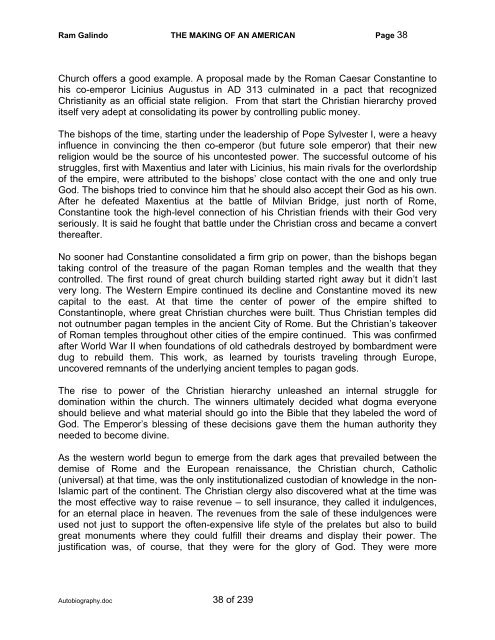Autobiography - The Galindo Group
Autobiography - The Galindo Group
Autobiography - The Galindo Group
Create successful ePaper yourself
Turn your PDF publications into a flip-book with our unique Google optimized e-Paper software.
Ram <strong>Galindo</strong> THE MAKING OF AN AMERICAN Page 38<br />
Church offers a good example. A proposal made by the Roman Caesar Constantine to<br />
his co-emperor Licinius Augustus in AD 313 culminated in a pact that recognized<br />
Christianity as an official state religion. From that start the Christian hierarchy proved<br />
itself very adept at consolidating its power by controlling public money.<br />
<strong>The</strong> bishops of the time, starting under the leadership of Pope Sylvester I, were a heavy<br />
influence in convincing the then co-emperor (but future sole emperor) that their new<br />
religion would be the source of his uncontested power. <strong>The</strong> successful outcome of his<br />
struggles, first with Maxentius and later with Licinius, his main rivals for the overlordship<br />
of the empire, were attributed to the bishops’ close contact with the one and only true<br />
God. <strong>The</strong> bishops tried to convince him that he should also accept their God as his own.<br />
After he defeated Maxentius at the battle of Milvian Bridge, just north of Rome,<br />
Constantine took the high-level connection of his Christian friends with their God very<br />
seriously. It is said he fought that battle under the Christian cross and became a convert<br />
thereafter.<br />
No sooner had Constantine consolidated a firm grip on power, than the bishops began<br />
taking control of the treasure of the pagan Roman temples and the wealth that they<br />
controlled. <strong>The</strong> first round of great church building started right away but it didn’t last<br />
very long. <strong>The</strong> Western Empire continued its decline and Constantine moved its new<br />
capital to the east. At that time the center of power of the empire shifted to<br />
Constantinople, where great Christian churches were built. Thus Christian temples did<br />
not outnumber pagan temples in the ancient City of Rome. But the Christian’s takeover<br />
of Roman temples throughout other cities of the empire continued. This was confirmed<br />
after World War II when foundations of old cathedrals destroyed by bombardment were<br />
dug to rebuild them. This work, as learned by tourists traveling through Europe,<br />
uncovered remnants of the underlying ancient temples to pagan gods.<br />
<strong>The</strong> rise to power of the Christian hierarchy unleashed an internal struggle for<br />
domination within the church. <strong>The</strong> winners ultimately decided what dogma everyone<br />
should believe and what material should go into the Bible that they labeled the word of<br />
God. <strong>The</strong> Emperor’s blessing of these decisions gave them the human authority they<br />
needed to become divine.<br />
As the western world begun to emerge from the dark ages that prevailed between the<br />
demise of Rome and the European renaissance, the Christian church, Catholic<br />
(universal) at that time, was the only institutionalized custodian of knowledge in the non-<br />
Islamic part of the continent. <strong>The</strong> Christian clergy also discovered what at the time was<br />
the most effective way to raise revenue – to sell insurance, they called it indulgences,<br />
for an eternal place in heaven. <strong>The</strong> revenues from the sale of these indulgences were<br />
used not just to support the often-expensive life style of the prelates but also to build<br />
great monuments where they could fulfill their dreams and display their power. <strong>The</strong><br />
justification was, of course, that they were for the glory of God. <strong>The</strong>y were more<br />
<strong>Autobiography</strong>.doc 38 of 239


